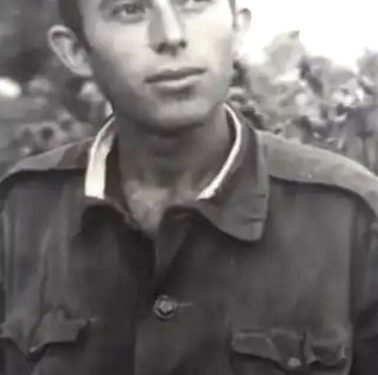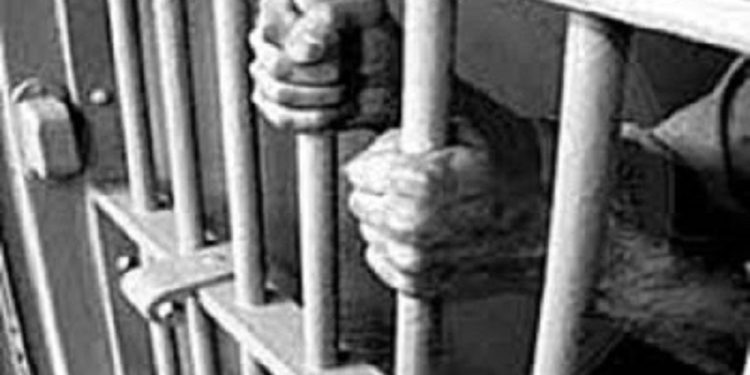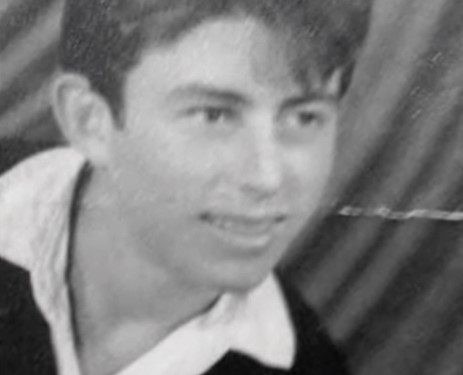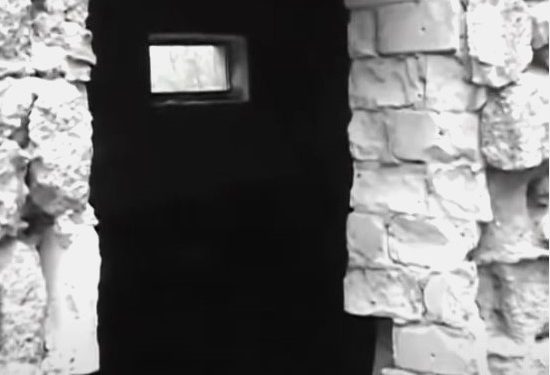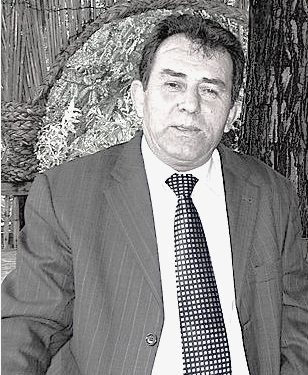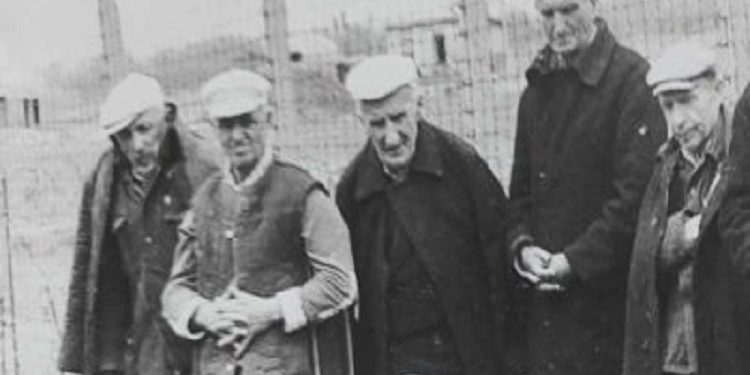By Shkëlqim Abazi
Part forty-two
Memorie.al / I were born on 12. 23. 1951, in the black month, of the time of mourning, under the blackest communist regime. On September 23, 1968, the sadistic chief investigator, Llambi Gegeni, the ruthless investigator Shyqyri Çoku, and the cruel prosecutor, Thoma Tutulani, brutalized me at the Branch of Internal Affairs in Shkodër, they split my head, blinded one eye, deafened one ear, after breaking several ribs, half of my molar teeth, and the thumb of my left hand. On October 23, 1968, they took me to court, where the pitiful Faik Minarolli gave me a ten-year political prison sentence. After half of the sentence was cut, because I was still a minor, sixteen years old, on November 23, 1968, they sent me to the political camp of Reps, and from there, on September 23, 1970, to the Spaçi camp, where on May 23, 1973, during the revolt of the political prisoners, four martyrs were condemned to death and executed by firing squad: Pal Zefi, Skënder Daja, Hajri Pashaj, and Dervish Bejko.
On June 23, 2013, the Democratic Party lost the elections, a process more than normal in the democracy we aspire to. But on October 23, 2013, the General Director of the “Renaissance” government sent Order No. 2203, dated 10.23.2013, for the release from duty of a police officer. Thus, Divine Providence was interwoven with the Neo-communist “Renaissance” Providence and, precisely on the 23rd; I was replaced by, no less and no more, but the former Security operative of the Burrel Prison. What could be more significant than that?! The former political prisoner is replaced by the former persecutor!
The Author
SHKËLQIM ABAZI
R E P S I
(Forced Labor Camp)
The First Meeting (Continued)
(The Boat Sunk in the Trough)
Under the pouring rain, my ear caught an occasional phrase, but I couldn’t connect the logical thread. Still, I clearly distinguished the terms “allowed-not allowed” and, in the end, someone who commanded loudly: “Let them meet!”
These words glued me to the door, which was delaying its opening. The anxiety of waiting was swelling my chest; my heart was pounding so fast that I thought it would break through my ribcage. I put my hand over it, but even my hand followed the same rhythm, rising and falling with the same speed.
The seconds of waiting behind the door seemed endlessly long. The rain, which continued to wash over me with the same intensity, no longer made an impression, because my brain, like my body, was numb and had stopped perceiving. This is the most interminable moment I have fixed in my memory; the most insufferable I have ever had to face in life.
Even today, forty-two years later, when I recall it and try to reason coldly about the contradictions of the feelings in those torturous seconds, I cannot connect the broken chain of logic. Perhaps this sudden process in an individual’s life only appears once, and it can have immediate and irreversible effects on the cells that condition aging. In different individuals, the phenomenon of waiting can have different effects.
However, what I experienced that time was an unbearable anxiety. The wait multiplied the adrenaline, stimulated the sensations, put the emotions in a state of total alarm, electrified the central nervous system, and in particular, caused a state of dread in the subconscious that prolonged the minutes endlessly, transforming them into months, the hours into years, and the days into decades.
Sound reason faltered, logic darkened and lost its perceptive ability, the real and the unreal tangled badly and caused an emotional turmoil; vital organs might have lost vitality, the body became limp and weak, thought was consumed by the eternal chaos that transcends the tangible, and perception did not match the circumstances.
Perhaps this phenomenon occurs in individuals who suffer severe trauma, as a result of which the organism undergoes essential changes, including cell necrosis, which accelerates wrinkling, increases gray hair in geometric progression; ultimately gifting us with aging.
Father and Son
Finally, the door opened. A policeman with a green cloak thrown over his head motioned for me to approach. I moved mechanically. Beyond the piercing thorn-curtain of the wires, my father, wrapped in a black oilskin cape, with a black cap on his head, waited. Under his frowning brows, torrents of pitch-black water streamed down.
“Are those tears? But why, are there black tears too? Am I seeing things or is this reality? Oh God, hold my mind!”
However, his whole being conveyed blackness through every nerve! “Oh God, blackness for me here, blackness for him outside! Black upon black, ‘Jhihi-i-jhi’!”
I remembered this Korean idiom, whose meaning was explained to me by Richard Rich, the American, when he tried to refer to resistance against evil. “Poison against poison!” he translated it for me, after I insisted on the Albanian explanation. But I’m not entirely sure if it was exactly the correct translation.
“Jhihi-i-jhi! Father!” I had unintentionally whispered these meaningless syllables, which caught the policeman’s attention.
“What are you talking about?!” the policeman asked me.
My father was staring intently into my retina. “My son must be losing his mind!” he must have thought in those moments, but he didn’t react. I, too, fell silent.
In silence, I reasoned: “The pitch-dark weather, the black policemen, the black dog, the black mouth of the sawyer, the black cells, Communism blacker than darkness itself, which strives to spread far and wide across the globe! The black father; I, black because I am black! Jhihi-i-jhi!… perhaps this balm best heals this wound; it perfectly suits this black-stained era, under this black power of tar-stained rulers!” I fell into rambling thoughts, and then tried to collect myself.
It seems the emotions I couldn’t suppress were more powerful than I had imagined. I had imagined the first meeting completely differently! So many times in sleepless nights, on the straw husks of the mattress, under the stinging bites of bed bugs, lice, and fleas, or in the frozen chill of the cells, I had brought it to life in my fantasy as a sublime, unique, and emotional moment when my father and I would hug. Perhaps words would fail us-a normal phenomenon for the conditions I was in-but the silence would be filled with the warmth of our bodies and the pounding of our hearts!
I had never imagined the meeting at such a distance, under these incessant sheets of water, me on this side, my dear father across the wires, numb and frozen behind the thorn-curtain, staring into each other’s eyes and remaining silent like two mummies.
The prolonged silence must have bored the police officer in charge of monitoring the meeting, so he intervened tactlessly: “Speak, man, or has the cat got your tongue!” he addressed me. “Friend, you have ten minutes!” he turned to my father.
But we didn’t utter a sound. I noticed the stream of water sliding from his face towards his neck, his reddened and puffy eyes, where a great fatigue or bitter pain was clearly visible. His appearance had changed a lot. Perhaps the long journey had worn him down, perhaps sleeplessness and stress had wearied him, perhaps the tears he had shed before meeting me-which he was now trying to hide under this grim façade-had negatively influenced him.
“Look, your father has come!” the policeman burst out again, pulling the edge of his cape over his forehead.
I made an extraordinary effort and composed myself: “Father, how is your health?” I barely recognized my own voice.
“Fine, but we were worried about you!” he stared at me as if seeing a stranger. “We hadn’t heard from you in a while!” he continued.
“Here I am!” I blurted out, because nothing else came to mind.
“Now that I’ve seen you, I’m calmer!”
“Me too!”
“I pray to God we meet more often!”
“I apologize; I’ve caused so much trouble!” I interrupted.
“Look after yourself, my son, and don’t worry about us!” He was talking quickly, which was not his habit. Judging by the way he spoke, which was unlike him, I thought he was rushing to express many things in the few minutes we had available. Although I didn’t believe he would hide something from me, a feeling told me that something must have happened.
I knew my father; he wasn’t the type to rush when speaking; on the contrary, like a meticulous calligrapher, he always chose the right word so that when he constructed the sentence, it would take its appropriate place, like a pearl in a necklace. “The fact that he won’t let me ask him-he’s hiding something! Undoubtedly, it must be something very painful!” The evil premonition was crushing me.
“Father, how is Grandmother?” I saw him flinch; his body seemed to shrink. The sudden question about the person I felt particularly close to made him uncomfortable. “It must be bad. She’s always been frail, anyway,” I thought.
But that man, who didn’t know how to lie, was chewing his words. He, in particular, knew my weakness for Grandmother. We, the children, idolized her. We called her Grandmother, and the whole neighborhood called her that. This synonym had replaced her real name, so much so that few remembered it. My entire world, all my loves, was summarized in Grandmother! She had raised me, she had nursed me, she had supported my first steps, and I had started my babbling with her, she had nourished me with endless love for knowledge even though she herself was uneducated.
She was the living archive of the family, she knew how to tell stories and fairy tales with a rich language, albeit a bit old-fashioned, making you feel as if you lived in the times of legends. She made me proud of my ancestors, telling me about the family tree, the relatives, and the grandfather I never had the chance to know. She was my spiritual guide and my first, most selfless teacher. We children found a safe haven in her lap; she protected us from physical punishments for all the mischief of youth. So, in short, Grandmother held a very delicate status in our house; her word was law; her will was action; her desires were commands that no one questioned, even if they weren’t always pleasant.
“Be strong, son, Grandmother has left us!” His drooping eyebrows and swollen eyes spoke more than his mouth.
“Where did this grim news come from? From my father’s mouth, or did the roaring of the thunder bring it to me, muffled from the Orosh Gorge?”
“Oh God!” this exclamation escaped me.
“She gave up her soul calling your name! I set off in this catastrophe to fulfill her dying wish! ‘Look after the boy! I won’t find peace even in that other world where I’m going!’ she said in her final moments. So, for her to rest comfortably where she has fallen, I came today, just after the three-day mourning period passed!”
I looked with a son’s compassion at that stern man whom troubles had aged prematurely. I could now clearly read in his reddened eyes and under his swollen eyelids the pain for the mother who had left this world with worries and for the son imprisoned and exiled to the depths of Mirdita. Suffering and worries had sealed the mark of premature old age on the features of this fifty-year-old. Only his pupils, with their sudden illumination, and his still-black eyebrows and mustache, suggested that I had a man in the prime of his life before me.
As I recalled these things, an unprecedented spasm squeezed my heart. A strong sense of compassion for the man who had brought me into the world with a thousand hardships, raised me, and educated me amidst poverty and class struggle, came and mixed with disgust and savage hatred for the regime that separated us while alive.
The diminutive figure of my beloved Grandmother, who never took off her black clothes, flashed before me. On one side, the pain for the irreplaceable loss; on the other, the troubles and worries that afflicted the others-it all engulfed my entire being. Blood rushed to my head. A gush of hot tears streamed from my eyes; some uncontrolled sobs burst from my chest. The premonition had not lied to me. I remembered everything that looked black to me. “We were living in a darkened time, under a cursed regime, with the cruelest executioners humanity had ever seen!” I was lost for words! Neither my father’s grim figure nearby, nor the furious downpour lashing my shorn head, had any effect.
“Hold strong, son!” my father’s tired voice sounded like a distant chime, brought with the lightning, muffled from the other world. “Be strong!” he added, and again silence. I, too, was silent. Silence and sobbing. The two meters separating us deepened the silence even more. The similarity between these two worlds resembled a concave mirror that distorted objects until they became almost opaque.
It divided the universe into two worlds of microscopic dimensions: the one where I was locked up surrounded by barbed wire, guarded by soldiers armed to the teeth, by border dogs, police, handcuffs, whips; and the other one, beyond these wires. This other world was also surrounded by clone-wires, behind which also vigilated guard dogs and soldiers armed with weapons and nurtured with class hatred, where my father and others who supposedly enjoyed freedom were condemned to vegetate. On the contrary, they writhed in the mire of terror, in the abysses of horror, in the company of scoundrels and prostitutes, in the world of nothingness and hypocrisy, in a surreal existence where they were forced to smile even when they were choked with gall, to sing even when they should weep, to praise even when they should wail, to surveil a relative, to spy on a brother, to betray a lover, a girlfriend, parents, wife, children, anyone who did not align with the current; that is, to boycott every visionary who transcended the times.
“You are grown up now!” my father’s voice came to me as if through a twilight. “Men face the wildest waves in life! We believe in you!” he added, his deeply wrinkled eyes intently fixed on me. “Whatever happens, remember that you have left behind parents, brothers, and sisters who love you very much and are waiting impatiently for you! We will always be by your side; we will overcome this trouble together. You have a duty to do your part, that is: to focus on your work and behave well to win the trust and goodwill of your friends, to acquire the best possible things without harming anyone; then, for whatever you need, you have someone to turn to-your three brothers and I will strive to provide it!”
He paused to take a breath; I sensed he was having difficulty breathing. A feeling of regret welled up for everything I had involuntarily caused him. But the minutes were running out, so I rushed to say: “Thank you for everything you have done for me! Especially you, Father!”
“What kind of talk is that, my son?”
“Here in this place, I may be in need of many things, but above all, I need books because I have started my studies”-in one breath, I rattled off a list of scholastic and extracurricular titles.
“Don’t worry; you will have them all as soon as possible. If not in person, then through the post office or I will find a way to send them…”
Precisely at that moment, the policeman intervened: “The meeting is over, ten minutes have passed, and you must part now!”
In fact, we were divided: two sets of barbed wire fenced the two worlds between us! The possibility of touching each other did not exist. Meanwhile, the horn of a car blared from behind the guard officer’s building.
“That’s the car that brought me, and it will take me back to Laç. Goodbye, son!” With the thick, trembling fingers of his hand, he blew me a kiss. After returning the greeting, I watched him turn his head towards me, and then he staggered until he disappeared behind the building. The rain continued at the same pace, while the darkness now stretched its black curtain and dominated the valley, and the hillside across the Fan River had dissolved into the gloom…!
With the bags in my hand, I walked toward the camp entrance. Drunken and shattered, under the torrents of rain, the shadow of darkness enveloped me.
EDUCATION
(My Universities)
Perhaps the reason to escape the suffocating routine compelled my friends and me to find the most effective means in those conditions to kill time. Driven by their encouragement, but with my own desire, I took up schooling.
Schooling in prison conditions! What bitter irony! Within that environment, heavy with violence and countless deprivations, I sought salvation through other means. Inside the enclosure where you were forced to spend twenty-four hours non-stop, in the same environment, with the same people, the poor prisoner would lose his orientation.
Since nothing new happened there to create some variation and fill the time gap, you often had to return again and again to old conversations. As a result, routine would seize you, and either you would fall prey to idle gossip, which plunged you into dead ends, so much so that you might end up hostage to banal fights, or you would succumb to some worthless vices, such as joining gambling groups, which again led to the same end: quarrels and brawls.
Therefore, the most responsible segment devised original methods to utilize the few free hours they had left in the most useful way. Consequently: some read, some wrote, some painted, some carved, some studied music or art, others who had no use for culture cooked, sewed, mended, knitted, washed clothes to secure something extra for survival; still others chattered idly and indulged in gambling games. So, everyone chose according to their intellectual abilities and individual tendencies.
The Daily Rhythm of Hell
In the depths of this state HELL, the schedule of activities was strictly monitored. Even breathing was programmed. The daily ritual began at five o’clock. The clanging of the bell was followed by the shrill whistles of the “serpents” and the howls of the town crier, and continued with the back-and-forth: latrine-faucet-soup cauldron. The chain lengthened to preparations for work-lining up in the dividing alley between the two camps-so that seven o’clock would find them at the construction site with tools in hand.
It continued there with digging-unloading-transporting soil and stones, followed by a break at noon, and restarted from the beginning. Under the pressure of physical violence and the threats of the work police, the norm had to be fulfilled without fail; otherwise, you ended up on the “road of Golgotha,” tied to poles with barbed wire. This dragged on until exhaustion and depletion of strength, until the bell clanged again, signaling the end of the workday. However, this often went on and on endlessly, especially in summer. Ten and even twelve hours! The working hours were tied to the desire and mood of the police.
The tool handover would finish, but on the “road of Golgotha,” the exhausting lineup would follow; the counting two-by-two in the humiliating sheep-pen. Often the count didn’t match, and the torment was repeated, two or even three times! Then the serpents’ whistles ordered another lineup; now in front of the soup cauldron. When your turn came, you took the vile broth and slurped it down, either ice-cold in winter or with dead flies in summer. If the guard officer felt like it, he would “bestow” a few free hours and… Again the lineup for the evening roll call.
The day ended as it began, with the whistles of the serpents and Malua’s howls, signaling the curfew throughout the camp. After this “freedom” signal, the soldier took over the word: “Turn back! Stop or I will shoot!” and with a prolonged “cough,” the “dance” of the automatic rifle and light machine gun would begin, aimed at human bodies.
The way a political prisoner spent his years in prison could be summed up without exaggeration in a single phrase, an unchanging program-diary: “Whistles-lineups-roll call-work-cauldron-ghosts.” Thus, in six words, you could define it: It started at five with the serpents’ whistles, continued with the lineup at the soup cauldron, again a lineup for the work front, then work and work, then whistles-lineups-roll call, and again whistles and whistles, and finally the last whistle, which transformed them into some white ghosts in cotton shirts and underpants!
To this synchronized exhaustion, I voluntarily added one more burden: preparing lessons. But at first, I didn’t think that along with the difficulties, I would also have to face the rigor of my teachers. If I had anticipated this trouble, I wouldn’t have dared to undertake these endeavors. On the contrary, I would have chosen to play a hand of dominoes today, a game of poker tomorrow, a story the day after, and a rare book just to kill time, as many others did.
Of course, this easy way of life might have given me some temporary satisfaction, but surely my future wouldn’t have aligned with this course; perhaps today I wouldn’t be who I am, with the great flaw of the “eternal student,” as a result of the effect of those years. They don’t say for nothing: “The head does, the head suffers” and “Appetite grows with eating, and knowledge with learning!”
But while there is a physiological limit to eating, beyond which you swell up and can’t continue, the brain, on the contrary, turns out to be an insatiable sponge, and knowledge a boundless space; the deeper you dive into this ocean, the more impatient you become, and curiosity urges you to dive and dive, in search of elusive pearls. Knowledge becomes a craze, and the craze an obsession, which perhaps only death can stop!
In school, I had been one of the best students. Parents and teachers were satisfied with my progress. Despite the economic troubles and political worries, my father was demanding of us; he would always find the right time to accompany us to school and extracurricular activities. Since in our small town, everyone without exception knew each other, it was not difficult to learn about your child’s progress; a walk on the town’s only boulevard was enough to meet all the teachers. My father did this and always had ample information about our progress./Memorie.al




